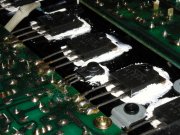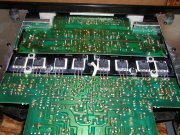- Joined
- Mar 10, 2012
- Messages
- 14,293
- Location
- Independence, MO
- Tagline
- I'm the Red Knight, by grant of the Black
I suppose what I'm facing with this amp is simply on the order of "Do this every few years, or at least check it." I bought this amp really cheap at a local audio meet, and asked no questions. Lately, I kept hearing static-like noise from time to time...and it was only getting worse. A preamp change did not change the noise. I pulled pre and power amps out of the system - just now had a look at the Proton's innards, being VERY familiar with the Cyrus 2's innards, and fairly confident it was not the source of the noise.
I eyeballed everything with a good flashlight. I wiggled one known source of trouble - the signal inputs, which are soldered to the main board. Yup, one was loose, but I can re-flow the solder. Then I saw more. Worse, it looks like someone had been in there ahead of me and used WAY too much heatsink compound. Do you agree?
So, I have three concerns:
1. A number of semi-bad to bad solder joints, easily solved.
2. There is some corrosion on some joints - is this a problem?
3. If there is (photo following) too much heatsink compound on the outputs, should I go ahead, clean and apply new? The white stuff looks a bit dry, and is even cracked in places. If I do clean and replace, I plan to use silicone.

I eyeballed everything with a good flashlight. I wiggled one known source of trouble - the signal inputs, which are soldered to the main board. Yup, one was loose, but I can re-flow the solder. Then I saw more. Worse, it looks like someone had been in there ahead of me and used WAY too much heatsink compound. Do you agree?
So, I have three concerns:
1. A number of semi-bad to bad solder joints, easily solved.
2. There is some corrosion on some joints - is this a problem?
3. If there is (photo following) too much heatsink compound on the outputs, should I go ahead, clean and apply new? The white stuff looks a bit dry, and is even cracked in places. If I do clean and replace, I plan to use silicone.


